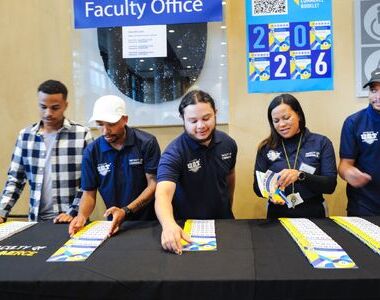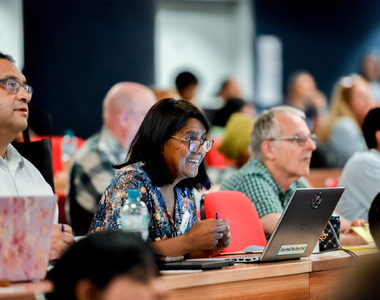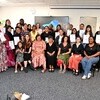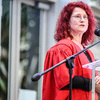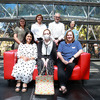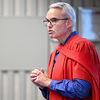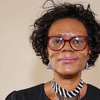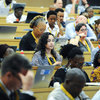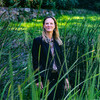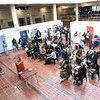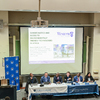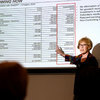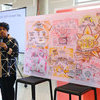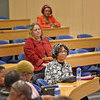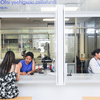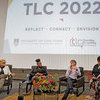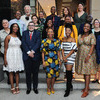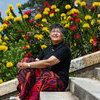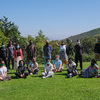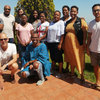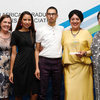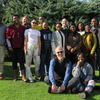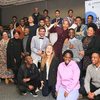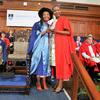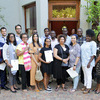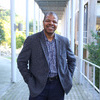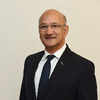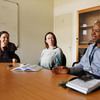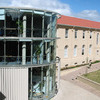UCT-linked programme marks a decade of support, survival and success
19 November 2025 | Story Myolisi Gophe. Photos Nasief Manie. Read time 8 min.
The journey from student teacher to full-time educator is often described as a “baptism of fire”, and for many South African graduates, that description is not far from the truth. This reality was brought into focus at the graduation ceremony of the Newly Qualified Teachers (NQT) Project participants, which marked its 10th anniversary this month.
The programme, supported by partners including the University of Cape Town (UCT), the Cape Peninsula University of Technology (CPUT), the HCI Foundation, and the Saville Foundation, provides structured mentoring, professional development, and emotional support to first-year teachers entering schools under increasingly complex conditions.
A group of teachers, mostly alumni of UCT and partner institutions, reflected on their first year in the classroom – a period characterised by steep learning curves, administrative pressure, and, in some cases, significant personal risk. While the event on 15 November acknowledged the considerable challenges facing new educators, it also highlighted the resilience, commitment and professional growth that the NQT programme has cultivated since its inception in 2015.
“Our work is to acknowledge that the transition from university to the workplace is exceptionally hard, to provide specialized support and to ensure that teachers do not feel alone as they navigate the transition,” guest speaker Associate Professor Rochelle Kapp noted.
Bridging the gap between training and practice
South Africa has no formal induction system for new teachers. As a result, graduates often enter schools without the institutional support structures common in many education systems globally. The steepness of this transition was a recurring theme throughout the event, with participants speaking candidly about the tension between their professional ideals and the realities of daily practice.
“The NQT [programme] reminded me that no man is an island. I learned that we need people we can lean on, and we must also be that support for others.”
Many graduates begin their careers in short-term contract posts, frequently teaching subjects outside their specialisations. They confront overcrowded classrooms, limited resources, heavy administrative loads and, in some communities, high levels of violence and trauma.
The NQT programme aims to address this “praxis shock” by offering a year-long programme of mentoring, reflective engagement, professional skills training and peer support. Over the past decade, more than 600 new teachers have passed through the programme, with several going on to become leaders in their schools and districts.
‘No Man Is an Island’
Among the testimonies shared at the event, the story of Ayabulela Mlombo, a newly qualified educator, resonated deeply.
Having completed her qualification in 2023, Mlombo entered the classroom this year after spending time at a well-resourced digital private school. Seeking a more meaningful professional challenge, she moved to a public school in a gang-affected community – a decision that placed her at the centre of complex social dynamics.
“The contrast between the two schools was like east and west,” she said. “The violence, the admin demands, the language barriers – everything felt unfamiliar.”
Her most difficult moment came when she attempted to break up a fight between two Grade 9 learners. In the process, she was pushed to the ground, sustaining an ankle injury that required hospitalisation.
“It was frightening. I didn’t know the area, I didn’t know anyone at the school, and I felt completely overwhelmed,” she recalled. “The first person I called, crying, was Judy (Sacks),” referring to her NQT programme mentor.
The programme provided her with crucial emotional support, practical guidance, and a sense of belonging during a period she described as “professionally and personally disorienting”.
Through mentorship, planning tools, wellness sessions and community-building activities, Mlombo rediscovered her confidence and found her voice in a school where Afrikaans remains the dominant medium.
“The NQT [programme] reminded me that no man is an island,” she said. “I learned that we need people we can lean on, and we must also be that support for others.”
From overload to excellence
For Siyasanga August, who is teaching physical sciences at his former high school, Masibambisane High School in Kraaifontein, the year unfolded with equal intensity. Initially assigned to teach maths and natural sciences to junior grades, he was unexpectedly thrust into the role of senior physical sciences teacher just two weeks before the June exams when a colleague resigned. The adjustment was overwhelming.
“I had never taught Grade 11 and 12 before,” he explained. “My planning was behind, my assessments were all over the place, and I was trying to keep up while learning in real time.”
Weekly mentoring sessions became a lifeline. Through the NQT network, he gained access to experienced subject specialists who shared resources, exam papers and curriculum guidance.
Though the first round of results was disappointing, August persisted. By the trial examinations, his learners achieved a 96.3% pass rate, a result met with warm applause at the event.
“It was not an easy journey,” he said. “But the NQT [programme] gave me structure, confidence and a community of teachers who understood exactly what I was facing.”
A decade of growth and a future of continued partnership
Since its establishment 10 years ago, the programme has grown from a small support initiative into a formalised, multi-institutional one aligned with UCT’s commitment to social responsiveness and sustainable educational systems.
Its model – a blend of coaching, peer learning, reflective practice and wellness support – has drawn interest from other universities and education districts across the country. Several NQT alumni now serve as mentors, and one graduate went on to win South African Teacher of the Year in 2021, highlighting the programme’s long-term impact.
“We are developing a community of teachers who inspire, who share, who care. And you are all very much part of this community.”
For UCT, the project reflects a broader institutional priority: strengthening the pipeline of early-career teachers who will shape South Africa’s educational future.
“The first year of teaching will always bring uncertainty,” Associate Professor Kapp noted, “but we realized that we needed to put something more substantial in place.”
She highlighted the realities facing many NQTs, including casualised contract posts and being asked to teach “out of phase and out of subject”, calling it “a real mark of a shift in the landscape that we need to keep making noise about”.
Despite these challenges, the decade-long mentoring programme has continued to thrive. She recalled the project’s origins in 2015, when overwhelmed first-year teachers confessed: “We’re just not coping … so we get together on a Friday evening and do tequila shots.” The programme, she joked, became “something a little more authentic than that”.
What has emerged, she emphasised, is a strong community of care and continuous learning. “You now have a toolbox … you will find your voice in that staffroom,” she told the cohort. Inviting them to remain part of the network, she concluded: “We are developing a community of teachers who inspire, who share, who care. And you are all very much part of this community.”
Melanie Sadeck from CPUT highlighted the extraordinary commitment of young teachers who travel long distances, often before sunrise, to serve their learners. She praised those teaching outside their specialisation and stepping into leadership roles, including one mentee who “had to become subject head just like that”.
 This work is licensed under a Creative Commons Attribution-NoDerivatives 4.0 International License.
This work is licensed under a Creative Commons Attribution-NoDerivatives 4.0 International License.
Please view the republishing articles page for more information.
Centre for Higher Education Development
In the news


.jpg)



































































